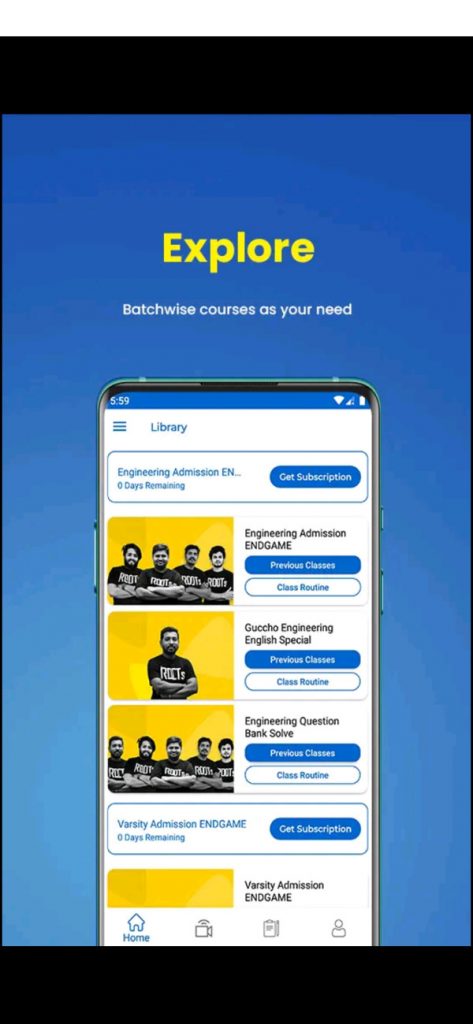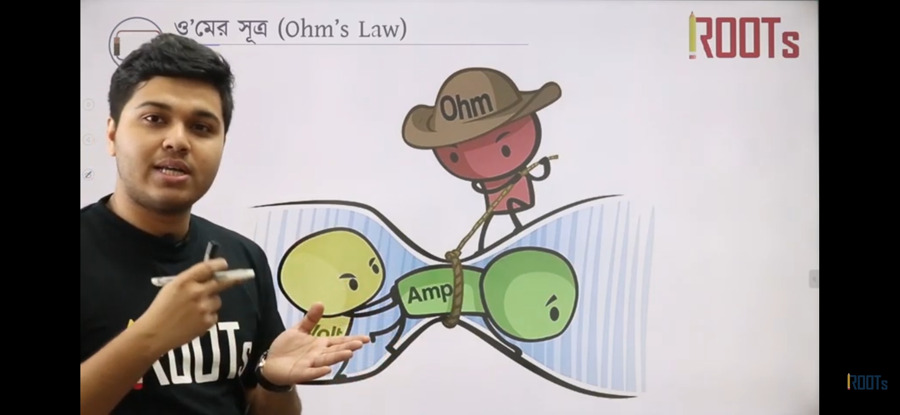
Tahir Hasan Riddha is the co-founder and CEO of ROOTs Edu, an edtech startup based in Dhaka. Founded in 2019, ROOTs covers SSC, HSC NCTB curriculum, and university entrance admission tests. The company says it has completed 350,000+ minutes of live classes and served about one lakh students. In June, the company raised an undisclosed pre-seed investment led by Omicon Tech Ventures.
In this fascinating interview with Future Startup, Mr. Tahir tells us about his background, founding and building an edtech startup from scratch in Bangladesh, talks about the state of ROOTs, the early days of ROOTs and how the company came to where it is today, how ROOTs work as a product and company, and its ambition going forward, discusses his experience of building a team, growing the business, shares his take on dealing with challenges of being a founder and much more.
Future Startup: Thank you for agreeing to this interview. Could you please tell us about your background and your path to entrepreneurship and what you are doing today?
Tahir Hasan Riddha: I was born and raised in Dhaka. My parents were both teachers. On most mornings, I would wake up in the middle of students as my father conducted private Math classes besides my bed. At that very early age, I began to learn pedagogy both subconsciously and consciously.
My father didn’t treat me like his other students. He did not solve for me random mathematical problems with which I struggled. He insisted that I solve those on my own. Instead, he taught me the basics. As a result of these experiences, I learned about different pedagogical techniques and learning mechanisms my father employed on me and his other students.
I learned how to learn any concept by heart and how to perform well in any competitive exam. My excellent academic performance enabled me to gain acceptance to several of the top educational institutions of Bangladesh, including Rajuk Uttara Model College, Notre Dame College, and finally BUET.
Like many BUET students, I began private tuition as soon as I got into BUET. As my popularity grew, I began teaching students in several areas of Dhaka in batches of 20 to 100. I consider myself more of a teacher by choice than a professional teacher. I really enjoyed teaching and experimented with various pedagogies with my students.
In 2013, I was asked to teach Physics and Math for the largest offline coaching center in Bangladesh. From 2013 to 2016, I was there and saw closely how large coaching operates. In 2016, I started a coaching center at Uttara with my co-founder Xihad. He is a graduate of MIST in Electrical and Electronic Engineering and a college friend of mine. Additionally, he has extensive experience in the teaching and coaching fields. We served thousands of students every year, especially those aspiring to get into BUET, DU, and other top-tier public universities.
During this venture, I learned how to build a team, how to manage people, how to scale a business, how to serve customers well and keep them happy, and most importantly how to address the major pain points facing students in our country.
Future Startup: When and how did you come up with the idea of ROOTs Edu and get started?
Tahir Hasan Riddha: The idea came to me in 2015. Most students in our country do not have access to quality teachers. There are few quality and popular teachers outside of urban areas. Moreover, talented graduates from prestigious universities (e.g., BUET or DU) do not choose the teaching profession because it is a low-paying one both economically and socially and thus not lucrative.
Each year, thousands of students come to Dhaka to get into university admission coaching centers and spend a lot of money to pass the admission tests.
We sketched an idea to connect the dots and solve the problem. We started our online operation under the name ROOTs Edu in April 2019, along with our offline coaching center. We conducted extensive research on our course curriculum, content, teaching method, and teachers before we started.

Future Startup: What went into building the initial operation of ROOTs Edu i.e., how did you put together initial investment and other resources to get started? Please walk us through what the first few months to one year of ROOTs Edu and your journey were like.
Tahir Hasan Riddha: In April 2019 we built our first LMS site on our own from scratch. My wife, Nitol who is from a CS background, designed the system architecture and I myself wrote the codes. We didn’t use any WordPress/LMS template as the product needed frequent pivoting and customization. We wanted to solve all kinds of problems a student faces in online learning, which deserved a fully customized self-depended tech solution.
We took an office cum studio at Uttara and imported a smart interactive display panel from the USA for, first time in Bangladesh. It was a very tedious task for us. We wanted to produce top-notch international standard content from the beginning.
In the early days, I and my co-founder Xihad were the only teachers in ROOTs. We made slides, shot video lectures, edited those, and uploaded them to our website all by ourselves. We took classes in our offline coaching center from 8 am to 5 pm and shot videos in the studio till late at night. The students appreciated our work a lot. Students found our content and products different from traditional e-learning platforms. It helped them grasp more concepts in less time.
We bore all expenses from our own pocket and earned revenue from our offline coaching. Gradually, we started generating revenue from ROOTs and hired developers, content managers, video editors, operation, sales, and marketing guys. In September 2020 we launched our learning app. In March 2021 Sadaf joined as full-time CTO and co-founder of ROOTs. He is also a BUET graduate and previously worked in Samsung R&D, Bangladesh.
Recently we’ve raised Pre-Seed investment from Omicon Tech Ventures, an initiative of Omicon Group. They have deep expertise in the education industry. The group owns leading publishing imprints, has the largest distribution channels with access to over 70% of educational institutions, and has one of the biggest digital content libraries in the country. With the investment from such a veteran conglomerate, our position in the edtech market has become stronger now.
Future Startup: What were some major challenges you faced in the early days and how did you deal with them?
Tahir Hasan Riddha: One of the major challenges was to convince students and parents that quality learning is also possible online. But a year into our operation, COVID hit and the product-market fit has been achieved automatically and quickly.
Another challenge we faced was to onboard the nation's brightest minds from top colleges (BUET, Medical, DU) as teachers on the platform. You can’t buy a teacher just with money. But, as we founders were also teachers, had deep connection and experience in the coaching industry and alumni connection in BUET, it was easier for us to show the vision and onboard them. They feel at home at ROOTs.
Future Startup: What were some of the things that worked, strategically, in the early days that helped you to grow the business and become sustainable?
Tahir Hasan Riddha: In a country like ours, to make a business out of education is taboo. Everyone thinks that education should be free and online educational content creators should provide quality content continuously totally free. But practically this is not a sustainable model and contains many loopholes.
We created a freemium business model. Recorded quality lectures of the whole syllabus are totally free in our app, Facebook, and YouTube channel. Live classes, doubt solving, exams, performance analytics, structured and distraction-free courses are offered in ‘ROOTs Plus Subscription’.
We made the subscription model simple for students with the tagline ‘Single Subscription Unlock All’. Where other edtech platforms sell courses, we sell time, just like Netflix. In a single subscription, a student can access multiple courses from multiple teachers and of multiple subjects. Students don’t have to pay for subject/topic/teacher-wise courses. Students choose what he/she wants to learn, from whom he/she wants to learn, in which batch he/she wants to join. This model solves three major problems of online learning at a time. Students loved it so much that they called our app ‘ROOTFlix’.
Future Startup: Could you please give us an overview of ROOTs Edu today i.e., an overview of your products and services, business model, how your operation works, size of business, team, etc.?

Tahir Hasan Riddha: ROOTS is an edtech company that specializes in competitive exams in Bangladesh. Currently, we serve students of class 9 through 12 (national curriculum) and admission aspirants for public universities such as BUET, DU, Medical Colleges, IBA, etc. Soon we will cover BCS, bank jobs, and other job preparation segments.
Through our website and learning app, students can access all content and study materials. On the app, students can also watch recordings of classes and take quizzes and tests. As a result, the student can study at his or her own pace. By analyzing a student's performance, our system provides detailed reports about their strengths and weaknesses in each subject.
'ROOTS Plus Subscription' is how we generate revenue. On the app and social media channels (Facebook, YouTube), students can watch recorded classes of the entire syllabus for free. Students pay for premium services such as live classes, doubt solving, exams and quizzes, performance analytics, choice of multiple teachers, structured and distraction-free courses.
We are a tight ship of 25 full-time team members. First, we design courses and curriculum. Before any live class, we prepare contents i.e. slides/scripts, etc. Both of these tasks need massive research which is done by our expert academic team. Then comes the final part, our educators take interactive and effective live classes from the studio. Additionally, we have academic team members who prepare quizzes and tests, provide 24/7 doubt solving support, and ensure content quality. We have an experienced operations team that maintains this workflow. The tech team collaborates with academics and operations teams to launch new features and update existing ones.
Until now, we have conducted 3,50,000+ minutes of live classes, 20+ courses with 20+ iconic educators.
Future Startup: From a product perspective, how does ROOTs Edu work? How do you work with your partners and customers? How does the tech part work?
Tahir Hasan Riddha: We believe in live, interactive classes. Students can learn spontaneously while attending live classes and have their doubts cleared instantly by teachers. Using our own live class technology, we conduct live classes on our app and website. We do not use any third-party software or platforms for live classes (e.g., Zoom, Meet, Facebook, etc.). We stream all the classes live from our studio using an interactive digital board. It enables students to learn more in less time and produces animated content live. Additionally, we provide performance analytics for every student as well as 24/7 doubt solving via our app and web.
We have developed a sophisticated content management platform. Since curriculum changes frequently in Bangladesh, it helps us in recreating and updating current content according to student needs. As opposed to a generic ed-tech platform, we are dynamic and focused on content.
We maintain a customer-first culture. Through our support channels, we strive to fix any academic, after-sales, and technical issues as soon as possible. We are attempting to give students of Bangladesh a taste of true edtech.
Future Startup: How have you attracted users and grown ROOTs Edu? Could you tell us about strategies and activities that you carried out to achieve the growth? How do your sales and marketing work?
Tahir Hasan Riddha: Our students purchase subscriptions after watching our free classes on social media platforms (Facebook, YouTube) because they find our content more effective than other free content available online. Our app saves them both time and money. Our average watch time, MAU, DAU, and customer retention rate prove that.
At the moment, we are solely using social media for sales and marketing. We are currently breaking even on an operational basis. At this stage, we are not only growing but also generating decent revenue.
We have achieved the current growth because of word-of-mouth marketing. We work continuously to improve our products by conducting extensive research and applying innovation. Our product is loved by students, and it solves their core problems. Our experience — 8 years of experience in the industry, background, and connections in the coaching industry have made this possible.
Future Startup: Pandemic continues to drag on: what kind of impact of the pandemic are you seeing in your business and how are you dealing with it?
Tahir Hasan Riddha: COVID has helped accelerate the growth of edtech and e-learning platforms all over the world. In Bangladesh, customer awareness and achieving product-market fit have both been accelerated.
After 1.5 years of COVID, we have developed a slightly different perspective. Things are changing rapidly. In our country, all kinds of educational institutions have been closed for a long time. Education technology complements mainstream education. We can't replace traditional education overnight. The urgency that students feel to study and pay for studying is gradually ebbing as all public and admissions exams are off for a long time.
We are restructuring our course curriculums based on students' needs. To help students in this pandemic situation, we have reduced our subscription fees significantly. We have increased the number of free live classes. These decisions and strategic moves have turned out positive for ROOTs.

Future Startup: What are some mistakes you’ve made if any, that you want other entrepreneurs to avoid?
Tahir Hasan Riddha: A mistake is an event that goes wrong. Every time we make a mistake, we try to learn from it. Then we train our existing and future employees on them.
Future Startup: Have you found anything particularly helpful or advantageous in the process of building ROOTs Edu?
Tahir Hasan Riddha: We always put ourselves in our customer's shoes when looking at a problem and try to see it from their perspective.
In some cases, customers can't tell you what the problem is, but you can detect it by using your previous experience and customer behavior patterns. In this case, our prior experience in the industry has helped us to stay ahead of our competitors.
Future Startup: Could you please tell us about the edtech market in Bangladesh? How big is the market? What are the major trends? What are the challenges and opportunities in the vertical?
Tahir Hasan Riddha: The Edtech era has just begun in our country. All players in the sector are trying to understand the market size and dynamics with their own metrics. For determining market size, customer behavior patterns and purchasing capability are also important. Everyone finds it very difficult to predict what will happen after COVID.
When it comes to edtech, Bangladesh is often compared to India. Even though the cultures and lifestyles of both countries are quite similar, some key metrics show that the Bangladesh market is entirely different from India, which is often overlooked by founders and investors.
There are different kinds of challenges and therefore different kinds of opportunities. Our edtech market has distinct categories: K-12, Undergraduate Admission, University, Continuous Education, Competitive Exam Segment, Skill development, etc. Our edtech market is big enough to support a few large venture-backed players each targeting a particular segment.
There are many challenges for edtech in Bangladesh. Our internet penetration is much lower compared to other countries in the SEA region. Local talents don’t want to work in the education sector because there is not much social recognition. The content and curriculum quality of our country isn’t up to the mark.
Every challenge is an opportunity. We are trying to solve all problems one by one. We have an experienced and passionate team that is dedicated to impacting millions of students of Bangladesh.
Future Startup: How do you stay productive and positive as a founder?
Tahir Hasan Riddha: I always do what is my job, what my company demands of me, and delegate the rest. It is important to me that my team members feel satisfied and happy. Once my team is happy and our customers are happy, it gives me satisfaction.
Future Startup: 3 books you would like to recommend to our readers.
Tahir Hasan Riddha: The 7 Habits of Highly Effective People, Start With Why, The Power of Positive Thinking
